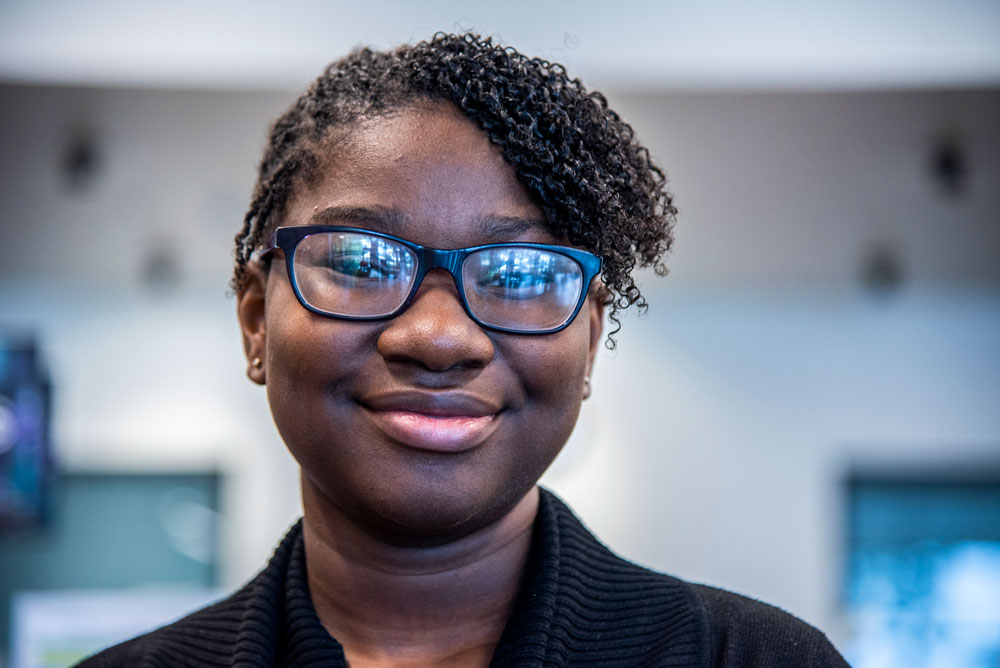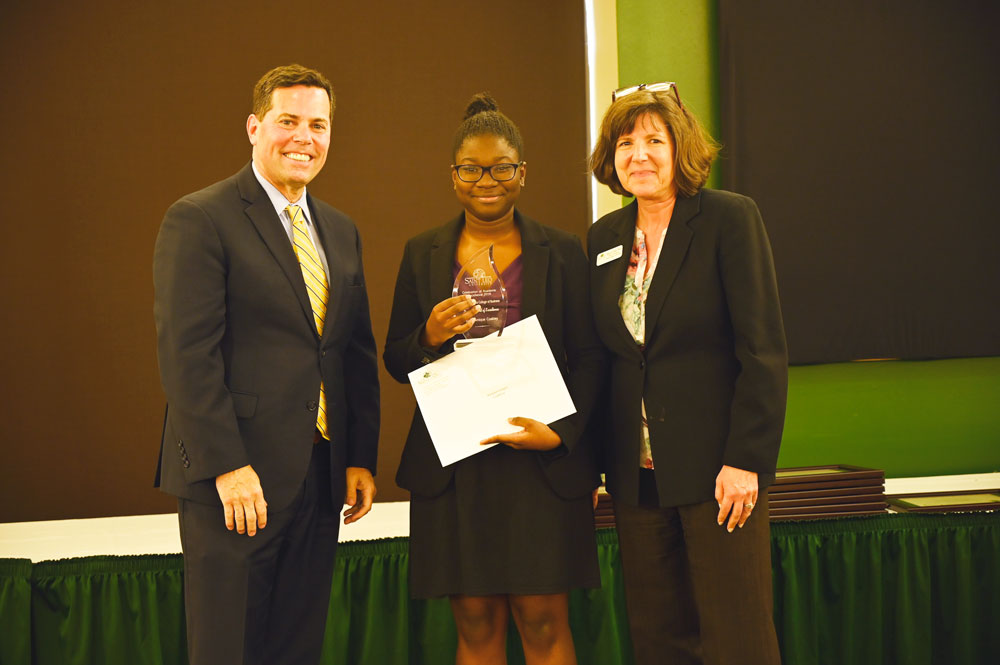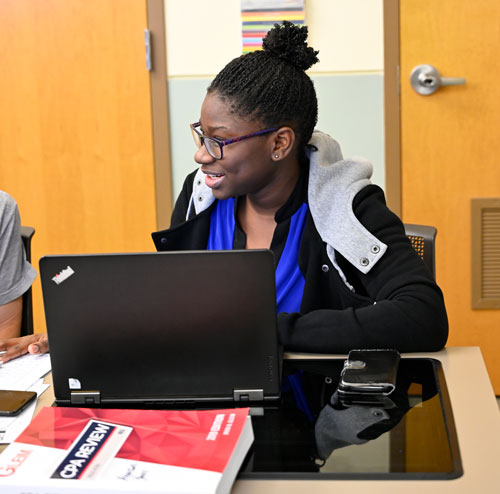Accounting Graduate Scores a Program First with Professional Exam Milestone
Her approach to choosing activities can be useful to campus students no matter what their major

Her approach to choosing activities can be useful to campus students no matter what their major

Just a few weeks since her graduation with a bachelor's degree in both accounting and economics, 20-year-old Randawnique Coakley has accomplished a first among her peers at Saint Leo University.
The 2019 graduate has taken and passed all four parts of the Uniform Certified Public Accountant Examination®, the test that future accountants must pass to meet one of the major requirements for working as a licensed CPA in the United States.
It is much more typical for accounting graduates to start studying for the first part of the exam in the summer after their graduation, or during a graduate program, and to proceed from there over the course of a year. People generally study several hours a day for five to six days a week, for up to two months for each portion of the exam, and each portion of the test takes four hours to complete.
 It is also common to have to re-take parts of the exam, as the general pass rate is 45 to 55 percent for each section among first-time test takers, industry statistics show. Coakley had to retake only one section.
It is also common to have to re-take parts of the exam, as the general pass rate is 45 to 55 percent for each section among first-time test takers, industry statistics show. Coakley had to retake only one section.
"Who passes all four parts of the CPA Exam before starting grad school? Nobody that I know," said Dr. Passard Dean, professor of accounting and finance at the Tapia College of Business at Saint Leo. No one except Coakley, who begins work for her Master of Accounting at North Carolina State University in August 2019.
So by all common standards, Saint Leo's Coakley is running ahead of schedule. "It helps with making me a better candidate looking for a job" after graduate school, she explained. She just does not want to have to be thinking about the exam while working hard to locate and excel at her first job, which will likely be at a public accounting firm.
It just seemed to Coakley that the most efficient path would be to group her professional exam studies with her efforts to master her regular undergraduate coursework. Deep study for one goal could only help reinforce her efforts to obtain the other goal, she reasoned.
Dual major and Honors Program
This strategy was available because Coakley was willing to carry an academic load as a Saint Leo undergraduate that surpassed that of some of her peers. She came to Saint Leo intending to major in accounting, which she discovered she liked during her final year at Catholic high school in her home city of Nassau, the Bahamas. An older sister chose Saint Leo for her own education, and Coakley thought the school would fit her well. "I like the small class sizes," she said. "I don't know how I would fare in a class of 200."
She also signed on for the Honors Program. The Honors Program admits high-achieving students into classes with heavy reading requirements and intensive class discussions as part of their core liberal arts curriculum. It also requires an oral examination and completion of a project in the upper-class years, accomplishments that can set graduates apart as they seek employment or admission to graduate programs. That made sense to a teen from a family of hard workers.
Something else happened for Coakley when she enrolled in a macroeconomics class. She really enjoyed learning about the economic system, and the perspective it offered reminded her of Honors Program classes. "It's not what to do with the numbers," she explained. That is covered in accounting. Economics, she found, is more about "what the numbers mean."
Economics is offered as a major through the Tapia College, so Coakley decided to carry a dual major.
That commitment made her early start on the CPA Exam possible. Each state sets its own rules for CPA licensing, and Florida, where Coakley was tested, requires that aspiring accountants must have already completed 120 credit hours before they attempt the first part. Most Saint Leo undergraduate programs, and other undergraduate programs, require 120 credit hours for degree completion, and that sets the per-semester pace for the typical undergraduate.
 Because Coakley was carrying added courses for her economics major, she had earned 129 credits by the end of the Fall 2018 Semester. That was also the first semester of her senior year, so she began her exams during her spring semester. She had already passed two sections of the CPA Exam by early April.
Because Coakley was carrying added courses for her economics major, she had earned 129 credits by the end of the Fall 2018 Semester. That was also the first semester of her senior year, so she began her exams during her spring semester. She had already passed two sections of the CPA Exam by early April.
This was part of the reason, along with a nearly perfect grade point average, that the Tapia College faculty and administrators honored Coakley with two awards on Academic Excellence Day, held April 4 on campus. Coakley was chosen for the Excellence in Scholarship Award and the Dean's Award for Excellence, which is the highest honor possible at the individual college level. (Pictured: Coakley with one of her awards, and with University President Jeffrey Senese and Tapia College Dean Robyn Parker.)
Outside the classroom
While Coakley's classroom and exam accomplishments are significant, there is more to what made her so successful at Saint Leo. She took a savvy approach to choosing her campus activities, and it is a method that can work for other campus students, no matter what their major.
Coakley thought through different ways she wanted to grow as a person, and what opportunities would give her chances to stretch. Some of her chosen activities related directly to gaining experience in business and accounting; others came out of her desire to overcome some natural shyness.
 She spent a portion of her free time, for instance, with the IRS Volunteer Income Tax Information Assistance program. The Tapia College opens some classroom space each tax filing season so that IRS-trained volunteers can meet privately with residents who need help completing their income tax returns at no cost to them. (She is pictured here, speaking with a client during a volunteer session; she also had her exam study guide with her.)
She spent a portion of her free time, for instance, with the IRS Volunteer Income Tax Information Assistance program. The Tapia College opens some classroom space each tax filing season so that IRS-trained volunteers can meet privately with residents who need help completing their income tax returns at no cost to them. (She is pictured here, speaking with a client during a volunteer session; she also had her exam study guide with her.)
College students work under the supervision of the trained volunteers. Coakley thought it would be a good opportunity to learn more about taxes. "You get to meet a lot of new people," as well. Faculty mentors add that student volunteers for the program gain confidence and practice in meeting clients for the first time and asking them financial questions.
Coakley was also active in the Caribbean Student Association and in the accounting club, and held officer positions in the latter.
She became involved, as well, as an officer and member of the debate club, and early on in her college career as a paid editor on the staff of the campus newspaper. Through those settings, she developed public speaking and writing skills, and encountered weekly opportunities to employ conversational and interviewing skills.
"It brought me out of my shell," she said.
She took on more responsibilities at the campus newspaper over time, and eventually began managing the payroll—a perfect match for a future accountant.
And now, she is much closer to that goal. At commencement, held April 27 in Tampa, FL, Coakley graduated summa cum laude. Near the end of May, she found out she had passed the final two sections of the CPA Exam.
"Near the end of the studying process for each section, I was mentally exhausted," Coakley recounted. "It is a large amount of material to know for each section. So, each time that I learned that I passed, I felt relieved. It was a weight lifted off my shoulders. Also, when I found out that I passed the final section, I felt blessed that I had the opportunity to complete and pass all of the exams at an early stage of my life and I felt blessed that I had great support from my family, friends, and professors during the rigorous exam process."
Dean, the accounting and finance professor, predicts that Coakley's intellect and work ethic will impress the faculty and administrators she will meet at NC State, where she has been awarded an academic fellowship and stipend. "They have seen Randawnique Coakley on paper. They have not yet met the very productive Randawnique Coakley in person."
Editor's note: As this story mentions, there are more requirements to gaining a CPA license beyond passing the exam, and the licensing authority where candidates live set the rules. A good place to start reading about this is https://www.aicpa.org/becomeacpa/cpaexam/examoverview.html.